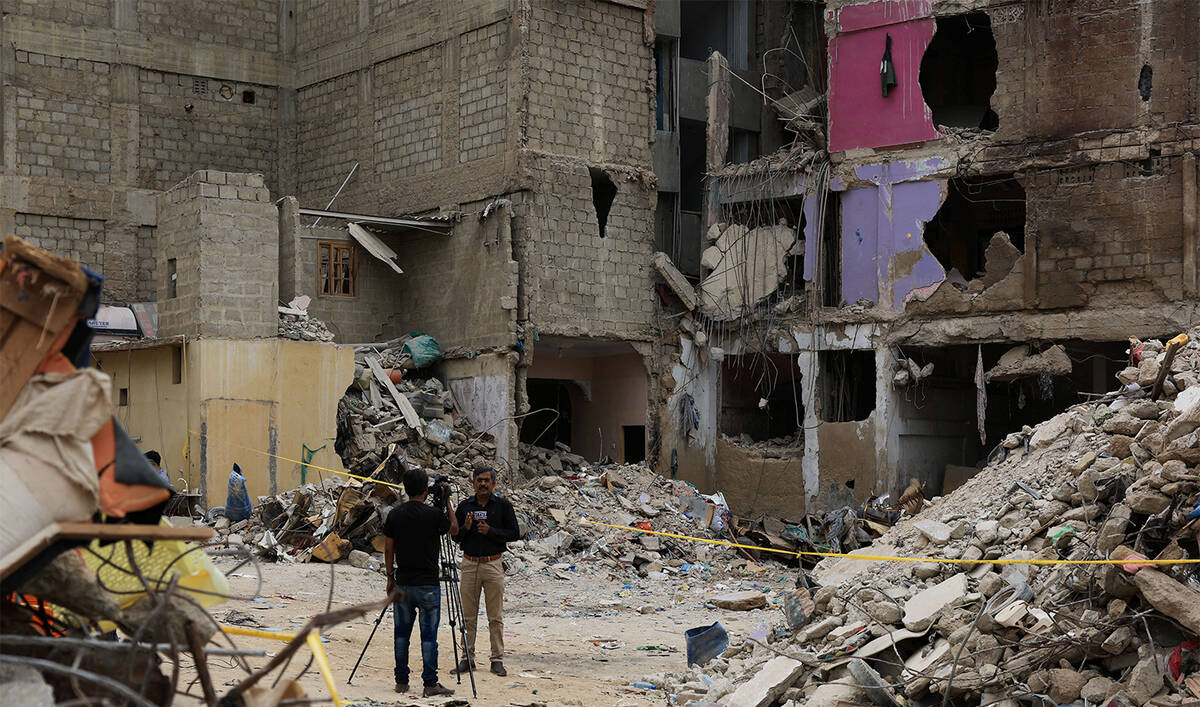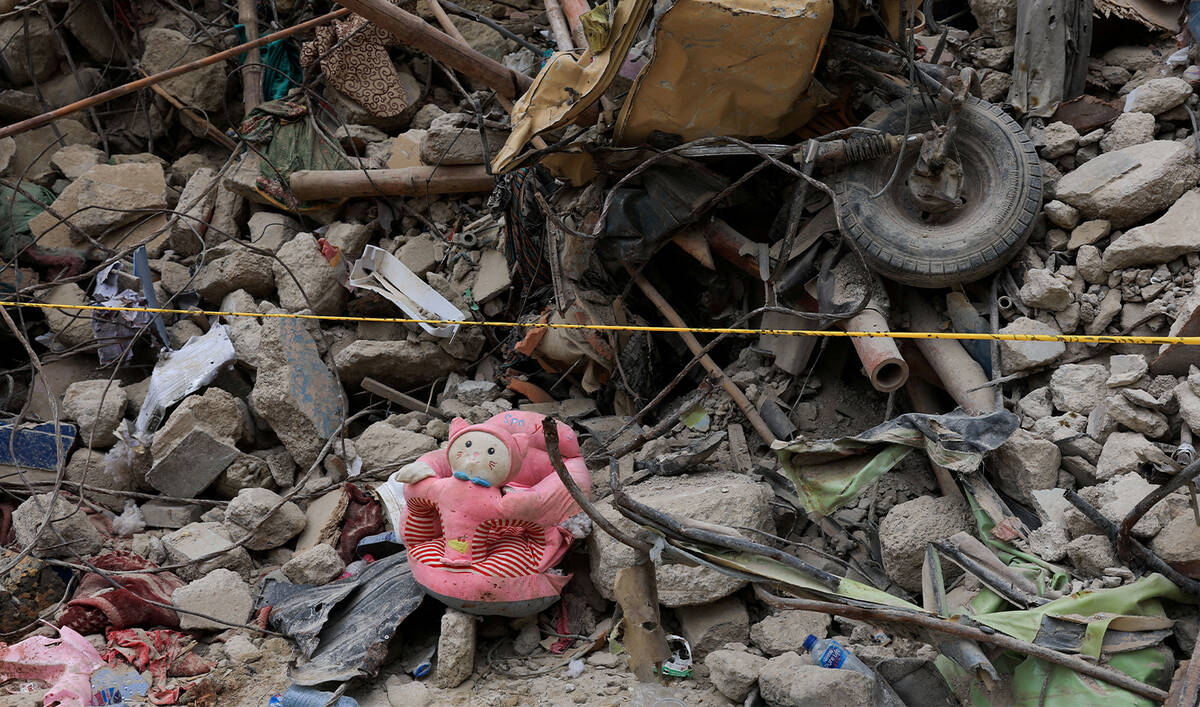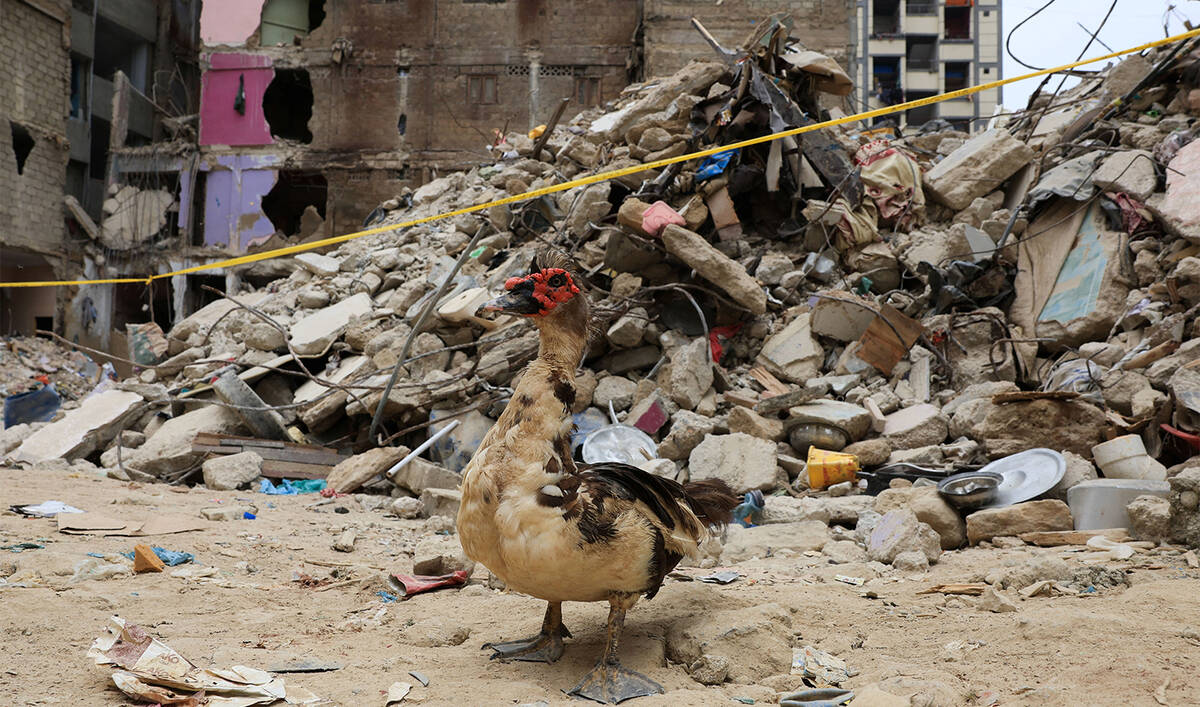ISLAMABAD: More than 14,500 Pakistani Hajj pilgrims have reached the Saudi holy city of Madinah via 60 flights on their way to perform the annual pilgrimage, the Pakistani religious affairs ministry said on Sunday, days after Pakistan launched its Hajj flight operation.
The country launched its Hajj flight operation on April 29 which will continue till May 31. Pilgrims will continue to leave for Madinah during the first 15 days of the operation and afterwards, they will land in Jeddah and travel directly to Makkah.
This year’s annual pilgrimage will take place in June, with nearly 89,000 Pakistanis expected to travel to Saudi Arabia under the government scheme and 23,620 Pakistanis through private tour operators. The total quota granted to Pakistan was 179,210, which could not be met.
“The arrival of Pakistani Hajj pilgrims in Madinah continues and so far, 14,670 pilgrims have arrived in Madinah via 60 Hajj flights,” Muhammad Umer Butt, who speaks for the Pakistani religious affairs ministry, told Arab News over the phone from Madinah.
Another 2,500 pilgrims will reach the Saudi holy city of Madinah via 11 flights on Sunday, according to Butt. The first groups of Pakistani pilgrims are scheduled to depart for Makkah on May 7 after completing their eight-day stay in Madinah. Departures will follow the sequence of their arrival in the city.
“Under the single-route system, all Pakistani pilgrims arriving in Madinah will travel to Makkah for Hajj and return home via Jeddah, while those flying directly to Makkah will visit Madinah before departing for Pakistan,” he shared.
The Pakistan Hajj mission has arranged accommodations near the Prophet’s Mosque in Madinah to facilitate pilgrims in offering voluntary prayers, according to the spokesperson. They are being served food by 13 catering companies, in accordance with Pakistan’s taste and standards.
Pakistani pilgrims praised the arrangements made by the Saudi authorities and the Pakistan Hajj mission.
“It is my first pilgrimage as I have never performed even Umrah before this, but my overall experience remains amazing,” Khurram Ahmed, who hails from Islamabad, told Arab News.
Sajid Ali Channa, an employee of the state-run Pakistan State Oil from Karachi who is performing Hajj for the second time since 2019, described his experience as “entirely new.”
“The Hajj ministry has made tremendous arrangements, and I’ve observed significant improvements, and a clear difference compared to 2019,” he said, adding that catering, transportation, and the problem-solving mechanisms were all functioning efficiently.
Mishkat Rehman, another pilgrim from Karachi who is performing pilgrimage with her family, said they were being provided all facilities.
“We haven’t faced any trouble like long queues at immigration at Karachi airport due to Route to Makkah project and we had a very peaceful travel,” she said.
Pilgrims from across the world are converging in Saudi Arabia to perform Hajj, which begins on the 8th of Dhu Al-Hijjah, the final month of the Islamic calendar.
Over 14,500 Pakistani Hajj pilgrims arrive in Madinah via 60 flights
https://arab.news/w3cp2
Over 14,500 Pakistani Hajj pilgrims arrive in Madinah via 60 flights

- Another 2,500 Pakistani pilgrims will reach the holy city via 11 flights on Sunday
- The first groups of Pakistani pilgrims are scheduled to depart for Makkah on May 7
Pakistani finmin ties tariff overhaul to $44.9 billion export target in FY26 budget

- The development comes weeks after Pakistan unveiled its tariff policy to enhance its exports to $44.9 billion this fiscal year
- Separately, the finance adviser announces an early retirement of Rs500 billion loan owed by the government to the central bank
ISLAMABAD: Pakistan’s Finance Minister Muhammad Aurangzeb has stressed the significance of sustained tariff reform as a cornerstone of Pakistan’s trade policy, the finance ministry said on Monday, as the country aims to boost exports, streamline imports and maintain a sustainable current account deficit.
The statement came after Aurangzeb chaired a meeting of a steering committee for the implementation of the National Tariff Policy, which aims to create a predictable, transparent and investment-friendly tariff structure by facilitating duty-free access to raw materials, phasing out additional customs and regulatory duties, and supporting nascent and green industries to pave the way for innovation, employment generation and sustained economic growth.
Pakistan has set an export target of $44.9 billion in the budget for this fiscal year that began on July 1, with $35.3 billion for goods and $9.6 billion for services sector. The government has proposed a target of $65.2 billion for goods imports, while it expects the imports of services to reach $14 billion, with the overall import volume significantly higher than export figures.
Speaking at Monday’s meeting, the finance minister highlighted that the steering committee was continuously monitoring progress of the tariff policy implementation, state of the country’s foreign exchange reserves, and guiding the transition of domestic industry, according to the finance ministry.
“The National Tariff Policy represents a five-year roadmap toward liberalizing trade, fostering export-led growth, and enhancing industrial competitiveness,” he was quoted as saying by the ministry.
During the meeting, the National Tariff Commission (NTC) outlined its pivotal role in safeguarding domestic industry through rational tariff structuring and trade remedy actions against unfair trade practices, including dumping, subsidized imports and harmful import surges.
The commission apprised the participants of its efforts to bolster institutional capacity, including organizational reforms, targeted technical training, automation of internal processes, establishment of a dedicated facilitation center for exporters, and initiatives to enhance legal and analytical capabilities to strengthen service delivery.
The finance minister urged the commission to ensure a level playing field for local producers, with the participants resolving to fully implement the National Tariff Policy to reinforce Pakistan’s trade competitiveness and industrial development.
Pakistan, currently bolstered by a $7 billion International Monetary Fund (IMF) program, unveiled the tariff policy last month to enable local industries to “scale, compete globally and shift toward higher value-added exports.” Key sectors expected to benefit include textiles, engineering, pharmaceuticals and information technology, with the policy designed to lower production costs and attract businesses.
Separately, Khurram Schehzad, an adviser to the finance minister, said the government had retired Rs500 billion ($1.7 billion) loan to the central bank early, with the overall early paydowns reaching Rs1.5 trillion.
“Early debt retirement while converting shorter-tenure with longer-tenure debt, significantly reduces concentration risk, lowers future liabilities, and strengthens the country’s macroeconomic foundations by curbing reliance on borrowing,” he said on X.
“This latest achievement builds on an earlier milestone — the successful buyback of PKR 1 trillion in market debt completed by December 2024 — the first such operation in Pakistan’s history. Combined, these two strategic actions amount to the early retirement of PKR 1.5 trillion in public debt in FY25, sending a strong signal of economic confidence and reform.”
He said these early repayments and smart refinancing, capitalizing on the significant decline in interest rates with the government’s disciplined borrowing, led to a staggering Rs830 billion in interest cost savings in the outgoing fiscal year that ended on June 30.
Pakistan officials in Dubai for two-day exchange on innovation in governance, service delivery

- Visit aims to boost cooperation with UAE on governance, competitiveness, reform
- Pakistan, UAE share longstanding ties underpinned by strong people-to-people ties
ISLAMABAD: A senior delegation of Pakistani government officials is in Dubai this week to participate in a two-day experience exchange program aimed at learning from the UAE’s governance and public sector innovation models, Pakistan’s embassy in Abu Dhabi said on Monday.
The program, running from July 8–9, includes sessions with various UAE ministries and authorities and focuses on innovative approaches to public service delivery, competitiveness, and institutional reform. The initiative comes as Islamabad seeks to modernize its public sector and strengthen economic cooperation with the Gulf nation.
On the sidelines of the visit, Pakistan’s Ambassador to the UAE, Faisal Niaz Tirmizi, met on Monday with Abdulla Nasser Lootah, UAE Deputy Minister of Cabinet Affairs for Competitiveness and Experience Exchange. Both sides reaffirmed their commitment to deepening collaboration in governance, reform, and digital public services.
“The Ambassador extended appreciation to the UAE Government for hosting a visiting delegation of senior Pakistani government officials,” the embassy said in a statement after Tirmizi’s meeting with Lootah.
The envoy also conveyed his gratitude on behalf of the Pakistani delegation “for the opportunity to engage in constructive dialogue” with UAE colleagues.
He also praised the Emirates for fostering “a model of inclusive development and harmony that embraces people from across the world, including the large and vibrant Pakistani diaspora.”
The ambassador noted that Prime Minister Shehbaz Sharif had shown “strong interest in learning from the UAE’s successful tax automation systems to enhance Pakistan’s domestic tax collection capacity” and had directed the visiting team to fully benefit from the opportunity for knowledge-sharing.
For his part, Lootah reaffirmed the UAE’s commitment to “seamless cooperation with Pakistan,” particularly in governance and innovation, the embassy statement said. He also stressed Pakistan’s potential across multiple sectors and said mutual learning could help both countries develop forward-looking policy solutions.
Pakistan and the UAE share longstanding ties underpinned by strong people-to-people connections.
More than 1.8 million Pakistanis live and work in the Emirates, which is Pakistan’s third-largest trading partner after China and the United States, and the second-largest source of remittances after Saudi Arabia.
Survivors grieve, worry about future after deadly building collapse in Pakistan

- The five-story building collapsed in a crowded area where many working-class and poor families live in aging apartment blocks
- The site is now a tangle of twisted metal, shattered concrete and scattered belongings, schoolbooks, shoes and sewing machines
KARACHI: Survivors of a building collapse that killed 27 people in the Pakistani city of Karachi were trying on Monday to come to terms with the loss of loved ones and their homes.
The five-story building collapsed on Friday in the overcrowded inner-city Lyari district where many working-class and poor families live in aging apartment blocks. The site is now a tangle of twisted metal, shattered concrete and scattered belongings, schoolbooks, shoes and sewing machines.
On Monday, rescue officials said the death toll had reached 27 and dozens of people were being housed in makeshift shelters following the building’s collapse and the evacuation of nearby buildings over structural fears.
“I grew up in that building. I knew everyone who lived there,” said Imdad Hussain, 28, a fisherman who lost neighbors, childhood friends and seven members of his extended family.

He is now sheltering with relatives, and family members are in mourning as they try to figure out what the future holds.
“We’ve lost our home, our people. I don’t know how we’ll start again,” he said.
Officials in Karachi, the capital of the southeastern province of Sindh, said the building had received multiple evacuation notices since 2023, including a final one in late June.
Saeed Ghani, Provincial Minister of Sindh for Local Governments, said the Karachi commissioner — who oversees the city administration — had been tasked with inspecting 51 buildings identified as “extremely dangerous” to prevent similar collapses.

BUILDING SHOOK VIOLENTLY
Residents said the building in Lyari, which has been home to generations of working-class families from minority and migrant backgrounds, shook violently on Friday before collapsing in a cloud of dust.
Rescue workers had been digging through the debris since Friday but declared the search over late on Sunday.
They said about 100 residents from 12 families had been living in the building, and nearly 50 more families had been displaced after three neighboring buildings were declared unsafe and evacuated.

Lakshmi, a school janitor who lived next door to the collapsed building, said her sister had lived in the building that came down and called moments before it fell to say it was shaking.
Her sister survived, but Lakshmi feared losing the gold she had left with her for safekeeping before her daughter’s wedding.
“We got out with our lives, but everything else is gone, with no certainty about what is to come,” Lakshmi said.
Pakistan confiscates 18 lions kept as pets in crackdown after attack

- Official says there are 584 lions and tigers in homes and breeding farms in Pakistan’s most populous Punjab province
- Keeping exotic animals as pets has been fueled by social media, with owners often showing them off as status symbols
LAHORE: Eighteen lions kept illegally as pets have been confiscated in Pakistan’s Punjab region, authorities said on Monday, as they launched a crackdown after one escaped from a house and attacked a woman and two children.
The woman suffered scratches and bruises, and the two children, aged five and seven, were hospitalized after the attack last week but their injuries were not life-threatening, provincial wildlife officials said.
The lion, which was kept without a license in a house in Lahore, was confiscated and sent to a local safari park, said Mubeen Elahi, director general of the provincial Wildlife and Parks Department. The owner was later arrested, police said.
Keeping exotic animals as pets has been fueled by social media, with owners often showing off their animals online as status symbols.
“According to the new regulations for keeping big cats, no individual is allowed to keep a lion without a license, without adhering to the required cage size, and without following other standard operating procedures,” Elahi said.
The punishment is up to seven years in jail.
As well as confiscating the 18 animals, the department raided 38 lion and tiger breeding farms and arrested eight people for violating the rules, he said, adding that all farms will be inspected by the end of this week.
There are 584 lions and tigers in homes and breeding farms in Punjab, Pakistan’s most populous province, he said.
“I know plenty of people who keep big cats as pets,” said Qaim Ali, 30, who himself had a lion but sold it after it attacked his nephew.
“Most of them are not interested in breeding but keep them as a symbol of power and influence in society.”
Etisalat CEO reaffirms investment commitment to Pakistan in meeting with deputy PM

- UAE telecom giant expresses interest in ICT expansion as Pakistan pushes for digital growth
- Meeting comes amid stalled PTCL privatization process over unresolved asset transfer issue
ISLAMABAD: The chief executive of UAE-based telecom firm Etisalat met Pakistan’s deputy prime minister in Islamabad on Monday and reaffirmed the group’s long-term investment commitment to the country, Pakistan’s ministry of foreign affairs said in a statement.
Deputy Prime Minister and Foreign Minister Ishaq Dar hosted Etisalat Group CEO Hatem Dowidar and a high-level delegation that included top Pakistani officials from the IT, commerce, and privatization ministries, as well as the Special Investment Facilitation Council (SIFC).
Dar highlighted Pakistan’s “growing digital economy and the government’s commitment to fostering a business-friendly environment. He invited Etisalat Group to expand its investments in the country’s ICT and telecom sectors,” a statement from the foreign ministry said.
Dowidar “appreciated the Government of Pakistan’s consistent support” and expressed interest in contributing to the country’s digital connectivity and growth goals, the statement added.
Etisalat currently owns a 26 percent stake in Pakistan Telecommunication Company Limited (PTCL), a former state-owned enterprise that was partially privatized in 2006. However, the transaction has been mired in disputes, with Etisalat withholding $800 million of the sale price over issues related to the transfer of properties promised as part of the deal.
Pakistan’s repeated efforts to fully privatize PTCL have faced delays due to the unresolved asset transfer issue and lack of consensus on valuation. The government has said resolving the matter with Etisalat is crucial for moving forward with broader privatization goals, especially under commitments tied to IMF-supported economic reforms.










